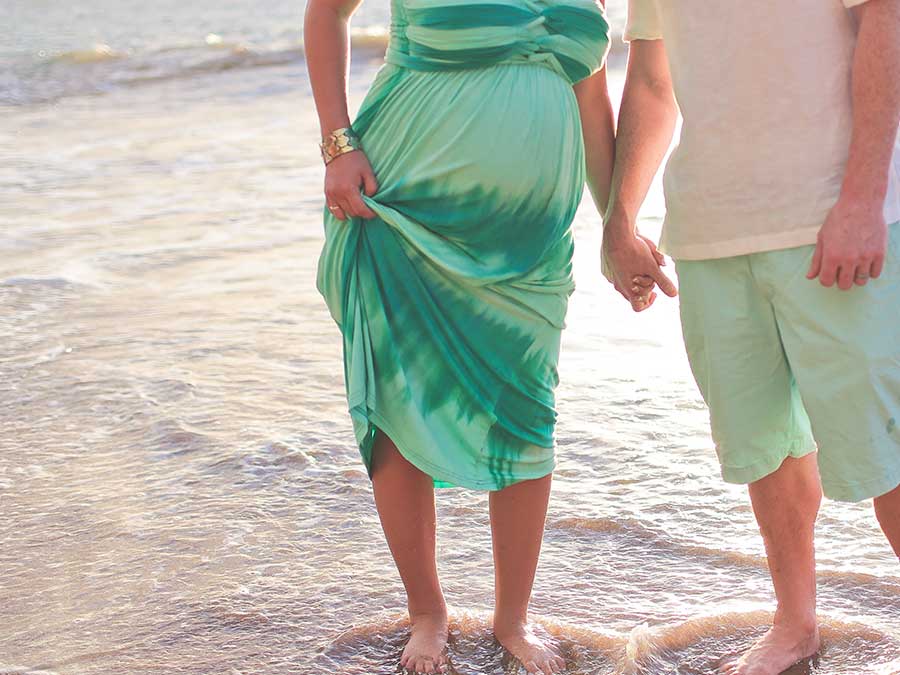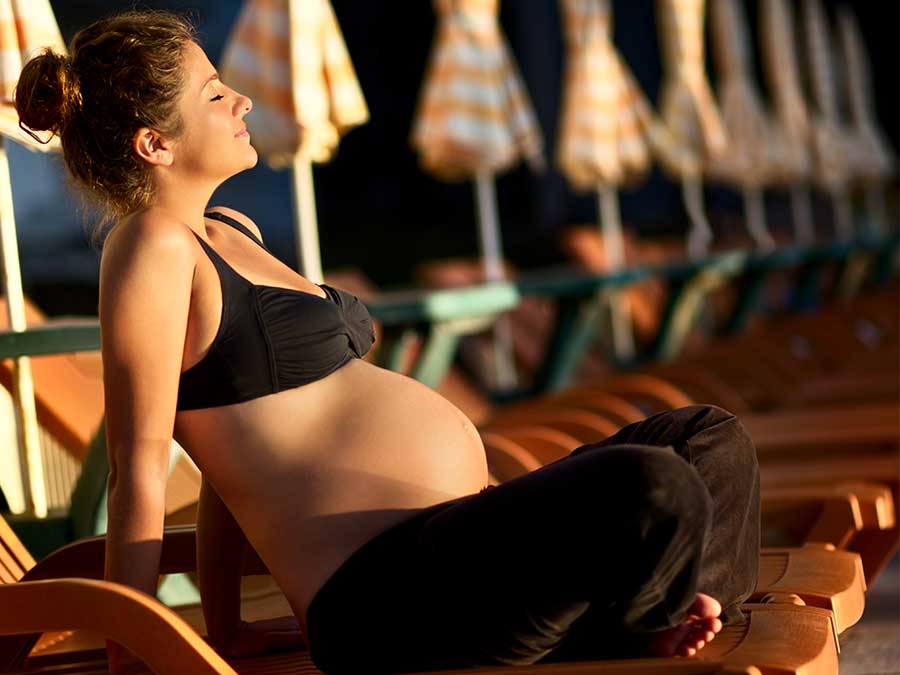
Planning a babymoon
Having a baby is a profoundly life-changing experience, especially for first-time parents. However, the time commitment and uncertainty of what comes next can be daunting. With that in mind, many couples like to savour that final chapter of alone time with a relaxing getaway before the plunge into parenthood.
Along with baby showers and gift registries, it’s becoming increasingly common for expectant parents to take a short holiday prior to the birth of their child, known as a babymoon.
It’s important to know your limits and plan accordingly. Consider both the timing and destination of your holiday to ensure your health is always your first priority.

How to travel safely while pregnant
If you’re heading overseas, the first thing is to check with your doctor for medical clearance to fly. If you’re too far along in the pregnancy, or have complications such as high blood pressure, gestational diabetes or abnormalities of the placenta, you may be advised not to travel – not what you want to hear after you’ve already booked your flights!
Factors to consider when choosing a destination include the availability of medical facilities and the risk of illness contracted through insect bites, or contaminated food and water.
Many countries require vaccinations for malaria, typhoid and hepatitis. Ensure you take the time to discuss with your doctor, as the effects of some vaccines have not been fully tested on pregnant women. Others, such as Yellow Fever, contain live viruses and are not recommended during pregnancy. Always err on the side of caution.
On the subject of illness, pregnancy reduces your body’s immunity to diseases. Not to mention, your baby is in a vulnerable stage of development. It goes without saying that you should steer clear of Zika virus hotspots. Areas around Brazil, the Caribbean and the Pacific Islands are all potentially great holiday spots, but currently have question marks in terms of Zika outbreaks, so save them for another trip.
When should you travel?
Medical wisdom says the best time to travel is during the second trimester (14-28 weeks). During this phase, the nausea and exhaustion of the first few months is likely to have settled down. Your body is more accustomed to pregnancy, but you’re not so far down the road that your mobility is greatly hampered.
However, you wouldn’t want to cut it too fine in any case. Approximately one in nine babies is born prematurely, so ensure you return home with plenty of time. You don’t want to get caught in the middle of nowhere for the big moment – least of all in mid-air – especially if you have a chosen birth plan.
Even if your pregnancy has been smooth sailing and you’re relatively comfortable, it’s essential to do some recon on your destinations. You need to know that if you require anything, medical facilities are easily accessible and of a reasonable standard.

Are you covered?
Each airline carrier has different restrictions. Air New Zealand, for instance, allows you to travel (with medical clearance) up to the end of the 35th week for flights over five hours. For shorter flights, you can travel up until the end of the 37th week. Though this applies to women carrying one baby in an uncomplicated pregnancy.
Similarly, Qantas allows up to the end of the 36th week for long flights, or up to the 40th week for flights under four hours.
Southern Cross Travel Insurance provides unlimited cover for unexpected medical complications up to and including the 23rd week of pregnancy, provided the pregnancy. This includes:
- Single pregnancy
- Multiple pregnancy, for example twins or triplets
- Pregnancy through fertility treatment
We’ll pay for emergency medical treatment if:
- There were no pregnancy related complications prior to your start date of insurance
- The claim is for a medical treatment related to an emergency pregnancy complication. Common pregnancy symptoms including breast tenderness, constipation, fatigue, frequent urination, heartburn and morning sickness are not covered.
The claim is for the early childbirth costs associated with a person named on the policy.

8 pregnancy travel tips
1. Take your time
The standard rate of sightseeing may be a stretch. This isn’t The Amazing Race; you don’t need to be sprinting between landmarks. Keep things low key, don’t overload your itinerary and explore at your own pace.
2. Don’t bump the bump!
While in transit, wear your seatbelt low (beneath the bump) to avoid placing pressure on your stomach. In a car, move your seat back as far as possible. You don’t want to bump your belly on the dashboard if the vehicle stops suddenly.
Bumpy roads and high speeds are also a no-no. Violent jolting can cause the placenta to detach from the uterus, interrupting the flow of oxygen and nutrients from mother to baby.
3. Circulation, circulation, circulation
You already know the importance of getting up and moving around during long trips. This is especially important during pregnancy when swelling sets in. Try to get up and move around every hour and stretch if possible.
Maternity compression pants are worth investing in to minimise swelling and optimise blood flow. For comfort, you can also pack DVT socks and a lumbar pillow.
4. Pack snacks
Travel often disrupts our regular eating patterns as we focus on getting from A to B. We’re also expending more energy than usual by constantly wandering around. It’s a good idea to pack nutritious snacks to keep you going when you need to keep your strength up.
Things like muesli bars or unsalted nuts are a safe bet – avoid salty snacks though. Too much salt intake can raise blood pressure and exacerbate swelling. Any Seinfeld fans also won’t need to be reminded of pretzels’ effect on thirst.
5. Plan your transport options
Too much walking can bring on cramps and dizziness. Although pregnancy will probably bring you deferential treatment wherever you go, crowded public transport in places like Japan, India or China may not be ideal. As well as the flight to reach the destination, consider how you’re getting from place to place once you’re there.
6. Be cool
Go somewhere you can stay cool. There’s nothing worse than enduring hot flashes in sweltering conditions. If the destination is prone to hot weather, good air conditioning is a must.
7. Treat yourself
While you may not be able to do some of the ‘fun’ stuff, you can focus your attention on being pampered. Take some time out and truly relax. A long weekend at a spa resort could be just the ticket. You’re growing a whole new person – the least you deserve is a few days of pregnancy massages and bubble baths in a peaceful setting.
If you’re too far along in the pregnancy to be covered by travel insurance, this could be a tempting alternative.
8. Keep good company
Any trip is made by the company you have. Happy memories are driven by people more than places. If you’d rather spend your babymoon in a group, consider going on a short trip to a beach house or hire holiday home with friends.
They will no doubt wait on you hand and foot. You’ll be surrounded by support and good vibes. And if the moment does arrive, you’ll have an army of helpers to get you to the hospital.
In summary…
- If you’re set on celebrating overseas, early in the second trimester is your best bet.
- If it’s not possible to get away until the last few weeks of the pregnancy, then consider a break closer to home and leave the big family holiday for after the baby is born.
- Surround yourself with support, whether it’s from your partner, family or friends.
The content of this article is general and provided for information purposes only. Southern Cross Travel Insurance (SCTI) doesn’t guarantee or warrant the accuracy, completeness or currency of any article.
This article may contain hyperlinks to other websites owned or operated by third parties, or references to third party products or services. SCTI isn’t responsible for, and makes no recommendation about, the content or accuracy of any third party website, or for the suitability or performance of any product or service. The inclusion of a link in this article doesn’t imply that SCTI endorses the website or third party product/service.





